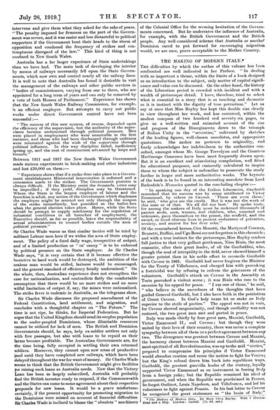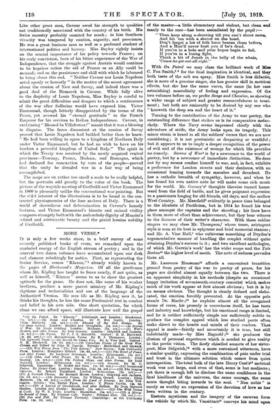THE MAKING OF MODERN ITALY.*
TEE difficulties by which the author of this volume has teen confronted are well indicated in her Preface. "In dealing
with so important a theme, within the limits of a book designed as an introduction to the subject, only matter of capital signifi- cance and value can be discussed. On the other hand, the history of the Liberation period is crowded with incident and with a wealth of picturesque detail. I have, therefore, tried to select what is essential to a story that is as touching and dramatic as it is instinct with the dignity of true patriotism." Let us say at once that Miss Bayley has kept this double aim clearly in view throughout her work, and has contrived, within the modest compass of two hundred and seventy-six pages, to give us a well-written and animated account of the rise and progress of the Risorgimento down to the triumph of Italian Unity in tho seventies," enlivened by sketches of the leading figures, well-chosen anecdotes, and appropriate quotations. She makes no pretence to originality, and freely acknowledges her indebtedness to the authorities con- sulted, amongst whom Mr. George Trevelyan and the Countess Martinengo Cesaresco have been most frequently drawn upon.
But it is an excellent and stimulating compilation, well fitted for educational purposes, and eminently calculated to inspire
those to whom the subject is unfamiliar to prosecute the study further in larger and more authoritative works. The keynote of the book is to be found in an interesting anecdote from Lord Redesdale's emories quoted in the concluding chapter :— "In speaking one day of the Italian Liberation, Garibaldi remarked that its success was by some attributed to Victor Emmanuel, by others to Cavour. 'There are even those,' he said, ' who give me the credit. But it was not the work of this man or of that. We all did our best.' He spoke truly, for among the makers of Italy must be reckoned thousands of patriot souls, men, women, and children, who, unnoted and unknown, gave themselves to the prison, the scaffold, and the sword, or lived obscure lives in patient endurance of privation, anxiety, and sorrow for her dear sake."
Of the remembered heroes, Ciro Menotti, the Martyrs of Cosenza, Brunetti, Ruffini, and Ugo Bassi are not forgotten in this chronicle;
and with a true instinct for the picturesque, Miss Bayley renders full justice to that very gallant gentleman, Nino Bixio, the most romantic, after their groat leader, of all the Garibaldini, who, though the soul of intrepidity in the field, never showed himself a greater patriot than in his noble effort to reconcile Garibaldi with Cavour in 1861. Garibaldi had never forgiven the Minister for the Treaty of Villafranca, and charged him with provoking a fratricidal war by refusing to redress the grievances of the volunteers. Garibaldi's attack on Cavour in the Assembly at Turin provoked a violent scene ; it was Bixio who rose to tho occasion by his appeal for peace. "I am one of those," he said, "who believe in the sacredness of the thoughts that have guided General Garibaldi, but I also have faith in the patriotism of Count Cavour. In God's holy name let us make an Italy superior to the strife of parties." The appeal was not in vain, for Cavour showed magnanimity, and though cordiality was not
restored, the two great men met and parted in peace.
Italy was made chiefly by four great men, Mazzini, Garibaldi, Victor Emmanuel II., and Cavour; but though they were united by their love of their country, there was never a complete sympathy between all of them or a perfect agreement between any
two. The divergence was greatest between Cavour and Mazzini, the harmony closest between Mazzini and Garibaldi. Mazzini, most spiritual of all Revolutionaries, was up to the mid "sixties," prepared to compromise his principles if Victor Emmanuel would abandon caution and rouse the nation to fight for Venice; but the King's refusal drove him back into republican ways. Garibaldi, the greatest guerrilla leader of the century, loyally supported Victor Emmanuel as an instrument in freeing Italy from a foreign yoke ; but the Republic remained his ideal of government, and when the Republic was proclaimed in France, he forgot Oudinot, Louis Napoleon, and Villaframa, and led his volunteers to fight against Prussia. In his last letter to Cavour he recognized the great statesman as "the brain of Italy."
• The Makiny of Modern Italy. By Mary me Bayley. With 7 Wubtra- tions and a Map. Lesion: Cassell. as. Od. netd
Like other great men, Cavour owed his strength to qualities not traditionally associated with the country of his birth. His Swiss ancestry probably counted for much ; in him Southern vivacity was tempered by caution, sagacity, and prescience. He was a great business man as well as a profound student of international politics and history. Miss Bayley rightly insists on the crucial importance of his policy towards France ; on his early conviction, born of his bitter experience of the War of Independence, that the struggle against Austria would continue to be hopeless unless the aid of France as an Ally could be secured; and on the persistence and skill with which he laboured to bring about this end. "Neither Cavour nor Louis Napoleon acted openly or honestly" in the matter of the secret agreement about the cession of Nice and Savoy, and indeed there was a good deal of the Bismarck in Cavour. While fully alive to the duplicity of Louis Napoleon, Miss Bayley is careful to admit the great difficulties and dangers to which a continuance of the war after Solferino would have exposed him. Victor Emmanuel, though bitterly disappointed by the terms of the Peace, yet avowed his "eternal gratitude" to the French Emperor for his services to Italian Independence. Cavour, in exclaiming "Blessed be Villaframea!" meant that it was a blessing in disguise. The fierce discontent at the cession of Savoy proved that Louis Napoleon had builded better than he knew. "He had been willing to agree to a kingdom of Northern Italy under Victor Emmanuel, but he had no wish to have on his borders a powerful kingdom of United Italy." The spirit in which the Treaty was received by the newly acquired central provinces-Tuscany, Parma, Modena, and Romagna, which had declared for annexation by vote of the people-proved that the unity he dreaded was in a fair way of being accomplished.
The maps are on rather too small a scale to be really helpful, but the portraits add greatly to the value of the book. The picture of the wayside meeting of Garibaldi and Victor Emmanuel in 1860 is pleasantly unlike the conventional war-painting. But the chief interest of the illustrations is to be found in the con- trasted physiognomies of the four makers of Italy. There is a world of shrewdness and determination in Cavour's homely features, and Victor Emmanuel's hirsute and animal virility compares strangely bothwith the melancholy dignity of Mazzini's refined and aristocratic beauty and the genial leonine nobility of Garibaldi.



































 Previous page
Previous page